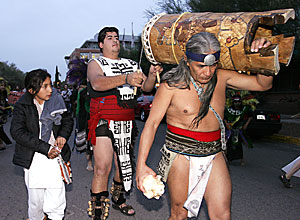 |
|
EVAN CARAVELLI/Arizona Daily Wildcat
|
Chauhtemoc, an Aztec of the Mexica tribe, leads a protest on Second Street after speaking out against the Andean Free Trade Agreement. Chauhtemoc claimed the proposed treaty would harm the indigenous people of the Americas.
|
|
|
By Jesse Lewis
Arizona Daily Wildcat
Monday, December 6, 2004
Print this
About 100 people from various Tucson groups gathered on campus Friday evening to peacefully protest negotiations for the Andean Free Trade Agreement.
Members of groups such as the No AFTA Alliance and Students for Free Trade protested delegate negotiations over AFTA and to show delegates why the agreement is not a positive one for South Americans and other producers.
The marchers started at Old Main and ended at the Tucson Convention Center, where the negotiations were in progress between delegates from Columbia, Peru, Ecuador and the United States, said Kate Sanderson, 55, a retired Tucsonan and supporter of the cause.
"Free Trade allows the rich to get as much as they can and poor countries don't benefit," Sanderson said.
Police were informed of the march ahead of time and officers from Tucson Police Department and the University of Arizona Police Department were blocking off the streets so the group could protest peacefully.
"We're letting them have their little freedom of speech. They were given a certain amount of time to protest," said Sgt. Steve Wheeler of TPD.
Patricia Morrison, a UA alumna, was at the protest and had prepared gifts for the delegates explaining the negative effects AFTA has on local, independent farmers.
She was handing out coffee mugs with a bag of coffee and a chocolate bar, which also included a story.
The stories were about the coffee farmer and cattle farmer who domestically grow their products. It told how with the United States opening its borders and allowing trade between countries, local farmers were being put out of business.
Products that come from outside of the country can be offered at lower cost, so consumers buy from the outside sellers rather than local farmers, causing these farmers to lose their businesses.
"We are showing there is another way to do trade. People can get living wages for their goods," Morrison said.
Mike Mullarkey, 31, a writer, said he thought the protest was going well and he was glad protesters could be peaceful in getting their point across.
"It seems like a peaceful display of people's opinions. It's good to hear an alternate voice - people think all fair trade is good," Mullarkey said. "Its good to have a dialogue rather than just widely accept it.
Gio Mosesso, a political science sophomore, went to the march to support the cause, but was disappointed in the number of other people who came to protest.
"I think the turnout was poor, it could have been organized better. A lot more students and protesters need to be out here," Mosesso said.
Mosesso said he thinks there was a poor turnout because there was not a lot of advertisement for the march, and not a lot of people knew it was happening.
"There are so many students who aren't here, organizations on campus could have gotten more people out here," Mosesso said.
